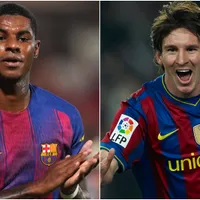Latinos in the United States represent a $1 trillion market in a country that has the second-largest Spanish-speaking population on the planet behind Mexico. So, it’s no surprise that MLS is trying to cash in on Latinos with a combination of Messi and Leagues Cup.
In its corner, MLS sits in the enviable position of possessing two crown jewels. The first is the world’s number one sports star, Lionel Messi. The second is the Leagues Cup, a joint competition with Liga MX. Both present MLS a golden opportunity to connect with the most lucrative segment of soccer fans in the US, the Mexican-Americans.
However, it’s not as simple as MLS connecting Latinos with Messi and Leagues Cup to create success this summer for MLS (and MLS Season Pass). It’s far more complicated. In fact, Latinos in North America represent a diverse diaspora with very different interests.
For example, most Mexican soccer fans aren’t fond of Argentina. For instance, Argentina knocked Mexico out of the 2006 and 2010 World Cups in the Round of 16, and defeated Mexico at World Cup 2022. Similarly, Mexicans have a rocky relationship with Messi especially after he accidentally disrespected El Tri at the World Cup.
That’s not to say that Mexican-Americans won’t watch Leagues Cup. But we’ve already seen a lack of interest in Mexico from TV partners. The feedback from industry executives in Mexico is that the games in the Leagues Cup tournament are seen as merely friendlies.
MLS success with Latinos may come from outside Mexico
Outside of Mexican-Americans, MLS is targeting other Latinos. The league has already made a positive head start. For instance, approximately 30% of MLS fans are Hispanic or Latino, according to a league spokeswoman. Plus, the league boasts the youngest fan base of any men’s pro league in the country.
Messi, certainly, will generate massive amounts of interest among Latinos in North, Central and South America. Major League Soccer’s hope is that the frenzy translates to subscriptions to its streaming service MLS Season Pass. That really is Major League Soccer’s ticket to success. In MLS Season Pass, it has one global platform where viewers can tune in to every game.
Our Pick:Includes: Every regular season game, MLS Cup Playoffs, Leagues Cup, & More |
 |
For MLS Season Pass to be a success to the Latino market, in particular, the service needs to overcome two main obstacles. First is the price point. Many Latinos are used to watching soccer for free on linear television, so MLS Season Pass’ price of $14.99 could be a deterent.
Likewise, the fact that MLS Season Pass does not have an app for Android mobile phones may be a roadblock for some fans. Nationwide, Android phones account for 46% of the US phones. Just as important, 53% of Hispanics use an Android in US, so MLS is at a disadvantage when trying to get people to sign up.
This season, so far, MLS coverage has felt like a red-headed stepchild. There is no Spanish-language MLS 360 whip-around show. Univision, Telemundo, ESPN Deportes and FOX Deportes all passed on acquiring the Spanish-language rights to MLS. And the studio that is used for Spanish-language coverage on MLS Season Pass is tiny in comparison to the gigantic English-language studio next door.
MLS ready to perform a balancing act
No doubt, the arrival of Messi to MLS adds plenty of intrigue and reasons to watch Leagues Cup. MLS executives are already overhyping up the competition before a ball has been kicked.
But, as hard as it sounds to believe, bringing Messi to MLS does present its challenges.
According to sources familiar with the matter, MLS has been telling talent to push Messi but not to push him too much because then viewers won’t care about the Liga MX teams.
Similarly, if MLS promotes Inter Miami too much and the team exits the Group Stage of the competition on July 25, Messi won’t play again for Inter Miami until MLS resumes on August 20. That’s almost one month of a Leagues Cup without Messi kicking a ball.
MLS needs Inter Miami to advance in Leagues Cup to build interest in the competition. Miami, the worst team in Major League Soccer, is paired with Cruz Azul and Atlanta United in the Leagues Cup.
Once the tournament begins on July 21, the hope is that the competition creates enough excitement on the pitch that interest grows as it advances from the Group Stage into the next rounds.
The path to riches is a complicated road.















